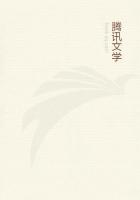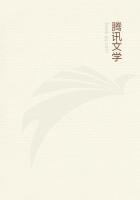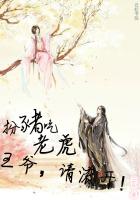'Come hither to-morrow and I will answer you,' replied Yspaddaden Penkawr, and as they rose to leave the hall he caught up one of the three poisoned darts that lay beside him and flung it in their midst. But Bedwyr saw and caught it, and flung it back so hard that it pierced the knee of Yspaddaden.
'A gentle son-in-law, truly!' he cried, writhing with pain. 'Ishall ever walk the worse for this rudeness. Cursed be the smith who forged it, and the anvil on which it was wrought!'
That night the men slept in the house of Custennin the herdsman, and the next day they proceeded to the castle, and entered the hall, and said:
'Yspaddaden Penkawr, give us thy daughter and thou shalt keep her dower. And unless thou wilt do this we will slay thee.'
'Her four great grandmothers and her four great grandfathers yet live,' answered Yspaddaden Penkawr; 'it is needful that I take counsel with them.'
'Be it so; we will go to meat,' but as they turned he took up the second dart that lay by his side and cast it after them. And Menw caught it, and flung it at him, and wounded him in the chest, so that it came out at his back.
'A gentle son-in-law, truly!' cried Yspaddaden, 'the iron pains me like the bite of a horse-leech. Cursed be the hearth whereon it was heated, and the smith who formed it!'
The third day Arthur's men returned to the palace into the presence of Yspaddaden.
'Shoot not at me again,' said he, 'unless you desire death. But lift up my eyebrows, which have fallen over my eyes, that I may see my son-in-law.' Then they arose, and as they did so Yspaddaden Penkawr took the third poisoned dart and cast it at them. And Kilweh caught it, and flung it back, and it passed through his eyeball, and came out on the other side of his head.
'A gentle son-in-law, truly! Cursed be the fire in which it was forged and the man who fashioned it!'
The next day Arthur's men came again to the palace and said:
'Shoot not at us any more unless thou desirest more pain than even now thou hast, but give us thy daughter without more words.'
'Where is he that seeks my daughter? Let him come hither so that I may see him.' And Kilweh sat himself in a chair and spoke face to face with him.
'Is it thou that seekest my daughter?'
'It is I,' answered Kilweh.
'First give me thy word that thou wilt do nothing towards me that is not just, and when thou hast won for me that which I shall ask, then thou shalt wed my daughter.'
'I promise right willingly,' said Kilweh. 'Name what thou wilt.'
'Seest thou yonder hill? Well, in one day it shall be rooted up and ploughed and sown, and the grain shall ripen, and of that wheat I will bake the cakes for my daughter's wedding.'
'It will be easy for me to compass this, although thou mayest deem it will not be easy,' answered Kilweh, thinking of Ossol, under whose feet the highest mountain became straightway a plain, but Yspaddaden paid no heed, and continued:
'Seest thou that field yonder? When my daughter was born nine bushels of flax were sown therein, and not one blade has sprung up. I require thee to sow fresh flax in the ground that my daughter may wear a veil spun from it on the day of her wedding.'
'It will be easy for me to compass this.'
'Though thou compass this there is that which thou wilt not compass. For thou must bring me the basket of Gwyddneu Garanhir which will give meat to the whole world. It is for thy wedding feast. Thou must also fetch me the drinking-horn that is never empty, and the harp that never ceases to play until it is bidden.
Also the comb and scissors and razor that lie between the two ears of Trwyth the boar, so that I may arrange my hair for the wedding. And though thou get this yet there is that which thou wilt not get, for Trwyth the boar will not let any man take from him the comb and the scissors, unless Drudwyn the whelp hunt him.
But no leash in the world can hold Drudwyn save the leash of Cant Ewin, and no collar will hold the leash except the collar of Canhastyr.'
'It will be easy for me to compass this, though thou mayest think it will not be easy,' Kilweh answered him.
'Though thou get all these things yet there is that which thou wilt not get. Throughout the world there is none that can hunt with this dog save Mabon the son of Modron. He was taken from his mother when three nights old, and it is not know where he now is, nor whether he is living or dead, and though thou find him yet the boar will never be slain save only with the sword of Gwrnach the giant, and if thou obtain it not neither shalt thou obtain my daughter.'
'Horses shall I have, and knights from my lord Arthur. And Ishall gain thy daughter, and thou shalt lose thy life.'
The speech of Kilweh the son of Kilydd with Yspaddaden Penkawr was ended.
Then Arthur's men set forth, and Kilweh with them, and journeyed till they reached the largest castle in the world, and a black man came out to meet them.
'Whence comest thou, O man?' asked they, 'and whose is that castle?'
'That is the castle of Gwrnach the giant, as all the world knows,' answered the man, 'but no guest ever returned thence alive, and none may enter the gate except a craftsman, who brings his trade.' But little did Arthur's men heed his warning, and they went straight to the gate.
'Open!' cried Gwrhyr.
'I will not open,' replied the porter.
'And wherefore?' asked Kai.
'The knife is in the meat, and the drink is in the horn, and there is revelry in the hall of Gwrnach the giant, and save for a craftsman who brings his trade the gate will not be opened to-night.'
'Verily, then, I may enter,' said Kai, 'for there is no better burnisher of swords than I.'
'This will I tell Gwrnach the giant, and I will bring thee his answer.'
'Bid the man come before me,' cried Gwrnach, when the porter had told his tale, 'for my sword stands much in need of polishing,' so Kai passed in and saluted Gwrnach the giant.
'Is it true what I hear of thee, that thou canst burnish swords?'
'It is true,' answered Kai. Then was the sword of Gwrnach brought to him.
'Shall it be burnished white or blue?' said Kai, taking a whetstone from under his arm.

